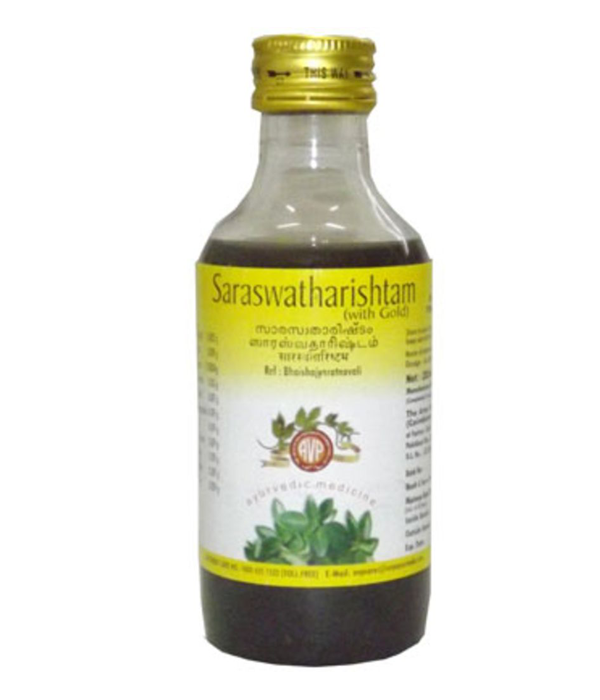

Saraswatarishta is an Ayurvedic medicine used in many health conditions. It is a liquid Ayurvedic medicine. Saraswatarishta contains 5 – 10 % of self generated alcohol in it. This self generated alcohol and the water present in the product acts as a media to deliver water and alcohol soluble active herbal components to the body. It is also called Sarasvatarishtam.
Saraswatarishtam dosage:
12 – 24 ml. one or two times a day, usually advised after food. If needed, it can be mixed with equal quantity of water.
It is advised to drink a cup of milk after taking this medicine.
Traditionally it is administered for one month time period.
How long to use?
Saraswatarishtam can be given for 2 – 3 months time. For long term use, it is best to use it for 2 months, then give a month gap, then continue again for 2 months and so on.
Saraswatarishta benefits –
Saraswatarishta is a anti aging herbs tonic.
It is a good memory tonic. It is good for people of all ages, improves immunity, voice tone and strength.
It is also used in mental conditions, epilepsy, insanity and to improve quality of semen and sperms.
Traditional benefits of Sarasvatharishtam:
For the benefits of students, this medicine has been specially formulated by Lord Dhanvantari.
It improves –
Ayu – life expectancy,
Veerya – potency, sexual capacity
Smruti – memory
Medha – intelligence
Bala – immunity, strength
Kanti – skin complexion and shine,
Digestion power
Vak vishuddhikara – it improves pronunciation, it helps to relieve all pronunciation mistakes
Hrudya – acts as cardiac tonic, good for heart
Rasayanavara – one of the best among all medicines of rejuvenation
Very useful in children, youngsters and old people, men and women.
Param Ojaskara – improves Ojas. (source of immunity)
Relieves voice hoarseness, speech problems
improves voice,
Rajodosha hara – useful to detoxify uterus and related organs, hence useful in female infertility
Shukradoshahara – cleanses and detoxifies semen. Hence useful in male infertility
Sarvadoshahara – balances all the three Doshas.
Ideal for one who read and sing for long periods of time
Good for people having depleted memory, strength and immunity
Saraswatarishta side effects: In prescribed dosage, it is not having any side effects.
Saraswatarishta ingredients:
Brahmi (Bacopa monnieri) – whole plant – 960 g
Shatavari – Asparagus racemosus – Root – 240 g
Vidari (Pueraria tuberosa) – Tuber – 240 g
Abhaya – Haritaki (Terminalia chebula) – Fruit rind – 240 g
Usheera (Vetiveria zizanioides) -Root – 240 g
Shunti – Ginger – Zingiber officinalis – Rhizome – 240 g
Mishi – foeniculum vulgare – Fruit – 240 g
Water for Kashaya – 12.288 liters,
Boiled and reduced to – 3.072 liters
Makshika – Honey – 480 g
Sita – sugar candy – 1.2 kg
Prakshepa –
Dhataki – Woodfordia fruticosa – Flower – 240 g
Renuka – Vitex Negundo – Seed – 12 g
Kana – Long pepper – Piper longum – Fruit – 12 g
Trivrit – Operculina turpethum – Root – 12 g
Devapushpa – Clove – Syzigium aromaticum – Flower bud – 12 g
Vacha – Acorus calamus – Rhizome – 12 g
Kushta – Saussurea lappa – Root – 12 g
Vajigandha – Ashwagandha – Withania somnifera – Root – 12 g
Vibhitaki – Terminalia bellerica – Fruit rind – 12 g
Amruta – Guduchi – Giloya – Tinospora cordifolia – Stem – 12 g
Ela – Cardamom -Elettaria cardamomum – 12 g
Vidanga – Embelia ribes – Fruit – 12 g
Twak – Cinnamon – 12 g
Gold leaf – 12 g
Pregnancy and lactation –
During pregnancy it is best avoided.
It can be taken during lactation period, under doctor’s advice, for a short period of time.